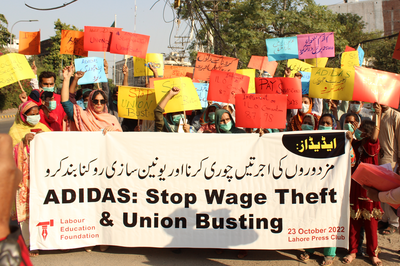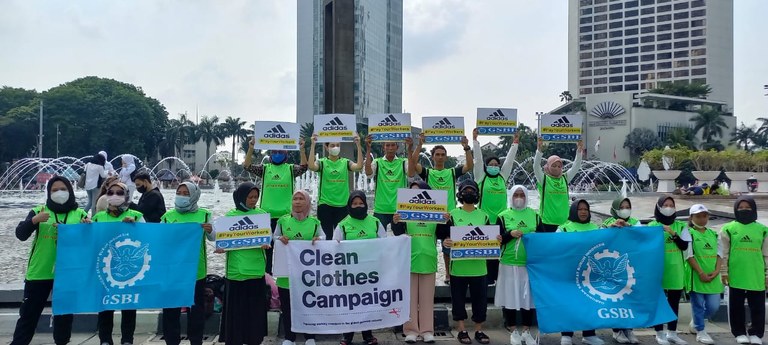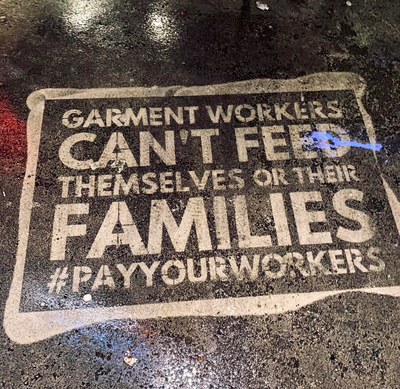Pay Your Workers - Respect Labour Rights
Brands and retailers around the world responded to the COVID-19 pandemic by cancelling orders, delaying placement of new orders, or forcing discounts on goods already produced. This way they offloaded the main risks and costs of the crisis upon the people who are least able to pay this price, after having been paid poverty wages for years: the workers. We see similar processes happening in other crises and want to break through this cycle. That is why labour rights organisations and unions around the world are urging apparel companies to ensure that all workers in their supply chain will never be left penniless again and can stand up for their own rights. Brands and retailers can uphold their responsibility towards the workers who enable their profits by signing the binding Pay Your Workers - Respect Labour Rights agreement on wages, severance and the right to organise.
By signing the agreement the company agrees to negotiate a settlement regarding the wages stolen from apparel, textile, and footwear workers in their supply chain during the pandemic. Companies signing the agreement will commit to paying a price premium on future orders into a guarantee fund reserved for severance in cases where employers in their supply chain have gone insolvent, or otherwise cannot be compelled to pay, in line with ILO Recommendation 202, Convention 95, and Convention 76. Workers who were employed in the supply chain of a signatory brand or employer will be eligible to file a claim if they are denied severance when their factory closes or they are fired in a mass dismissal. The Pay Your Workers agreement is an enforceable agreement with garment worker unions.

Find out more
The 280+ endorsers of the Pay Your Workers / Respect Labour Rights coalition are urging brands to sign a binding agreement on wages, severance and the right to organise. Find out more about our demands in the frequently asked questions.
Go to payyourworkers.org and adidasSTEALS.com to find out more about the campaign and take action.
 Frequently Asked Questions
Frequently Asked Questions

What does the Pay Your Workers / Respect Labour Rights campaign ask for?
Brands and retailers must sign a legally binding agreement to:
- Settle outstanding wage payments to workers in their supply chain from the Covid period;
- Make sure workers are never again left penniless if their factory goes bankrupt, by signing onto a negotiated severance guarantee fund; and
- Protect workers’ right to organise and bargain collectively.
Should employers (supplier factories) not just pay the wages and benefits, including severance?
Yes, they should – but in many cases, they can’t. Brands and retailers have been the primary profit-makers and de facto employers in these supply chains, dictating both prices and production circumstances. Brands have a responsibility under the UN Guiding Principles on Business and Human Rights and the OECD Due Diligence Guidance to prevent and mitigate adverse human rights impacts in their supply chains, and to remedy harm they have contributed to or caused.
How should brands pay their workers?
Apparel brands and retailers must sign the Pay Your Workers - Respect Labour Rights (PYW-RLR) agreement and settle all outstanding wages since the start of the pandemic to all apparel, textile, and footwear workers in their supply chain, as well as pay into a severance guarantee fund that will ensure workers who lose their jobs in the future are paid their legally owed severance.
What is the “Severance Guarantee Fund”?
The legally binding and enforceable PYW-RLR agreement will support stronger social protections for workers related to unemployment and severance benefits, in line with the relevant ILO conventions, through the establishment of a Severance Guarantee Fund (SGF).
Workers who were employed in the supply chain of a signatory brand or employer will be eligible to file a claim if they are denied severance when their factory closes or they are fired in a mass dismissal. The SGF will take up claims from workers whose employer cannot be compelled to pay and in cases where national legislation falls short of the international standard. It will also provide financial support to improve social protection systems at the national level, and set up dedicated accounts for this purpose which can be accessed by national committees including government, employers, unions, and civil society representatives. As social protection systems improve, the brand premiums will be reduced accordingly.
Brands and retailers will contribute through a fee based on volume sourced from each country, and employer fees will be a percentage of their wage bill in each country. This is part of the larger movement to establish more sustainable and resilient industries in the near future, consisting of supply chains with better planning and pricing models, which includes a costing model that covers fair payment schedules, and financial space for living wages, safe factories, and social benefits.
It will also provide financial support to improve social protection systems at the national level, and set up dedicated accounts for this purpose which can be accessed by national committees including government, employers, unions, and civil society representatives. As social protection systems improve, the brand premiums will be reduced accordingly.
How will the legally enforceable agreement support labour rights?
Upon signing the agreement, company signatories agree to respect workers’ rights, including the right to organise and bargain collectively. The agreement will include a mechanism to identify and investigate non-compliance and worker grievances in cases of failure of payment and in cases of anti-union retaliation or harassment, gender-based violence and harassment, and occupational health and safety violations. The agreement will be enforced through a mechanism built on the standard set by the Accord on Fire and Building Safety in Bangladesh from 2013 on: a dispute resolution mechanism, where the union signatories can ultimately take the brands to court if they fail to uphold the agreement and an escalation protocol where brands will ultimately have to cease sourcing from employers who fail to uphold the agreement. This will also enable brands to be better aligned with current and upcoming due diligence legislation.
Oversight of the agreement will be subject to negotiation; the Bangladesh Accord as established in 2013 provides a proven model to draw from. This includes independent oversight, through a combination of full transparency and a Steering Committee made up of the signatories, together with representatives of the national committees referenced above, and global NGO representatives as witness signatories in a non-voting capacity. The ILO can be invited to act as independent chair, and an ILO-empowered expert committee can assess national social protection projects for financing and determine progress.

How should brands and retailers go about signing the agreement?
Brands and retailers can contact the union committee of the PYW campaign, and confirm they are willing to enter into negotiations with trade unions for a legally binding and enforceable agreement and that they are willing to pay a small price premium on FoB.
How much will this cost brands?
Brands will be asked to pay a premium of 0.5% of annual FOB. The fee can be reduced if a brand sources from countries that establish credible and effective social protection programs covering unemployment and/or severance benefits, or if its suppliers sign on and contribute to the Fund. If all of a brand's suppliers sign on, or if the brand is exclusively sourcing from countries that have fully functioning social protection programmes, its fee will go close to zero.
The agreement will include a trigger mechanism for implementation, which will be defined either by the number of brands that have signed on or by total amount of purchasing volume. Cooperation from the International Finance Corporation (IFC) or other international finance institutions can be sought to front-load the brand premium contributions, enabling relief in the short term while also enabling brands to spread the payments out over a dedicated period.
All told, it will cost brands no more than ten cents per t-shirt to meet all the obligations foreseen in the Pay Your Workers agreement.
How does the Severance Guarantee Fund relate to the Global Fund for Social Protection?
The idea of a Global Fund for Social Protection starts from the finding that social protection floors are affordable, provided low-income countries receive international support in order to complement their own efforts to mobilize domestic resources. The establishment of such a Global Fund, financed by governments worldwide, would support and co-finance – on a transitional basis – the creation of a broad, rights-based social protection for all in low and middle income countries where this is not yet sufficiently developed. Based on conditions in the pre-COVID-19 era, some 10 to 15 countries have social protection financing gaps amounting to more than 10 percent of their GDP, and require temporary international co-financing of minimum social protection floors, while they strengthen domestic resource mobilisation. Other countries require capacity strengthening and technical support to build their systems. More information can be found here.
Achieving social protection floors providing social protection for all will require some time – even with the help of a Global Fund for Social Protection. But workers in the garment, textile and footwear sector can’t wait any longer. In order to meet urgent needs, sectoral initiatives like the Severance Guarantee Fund are needed. The Severance Guarantee Fund is complementary to a Global Fund for Social Protection and helps to fill gaps in existing systems of social protection. While the Global Fund aims to mobilise public money, the Severance Guarantee Fund puts the responsibility of global brands and retailers for the social protection of the workers in their supply chain at the center, in line with UN Guiding Principles on Business and Human Rights. Moreover, even where national social protection systems do exist, guarantees on severance pay and wage arrears are rarely included. A sectoral, complementary approach can help to close this gap in social protection systems. And lastly, the Severance Guarantee Fund can be a catalyst for the broadening of social protection to other sectors and the society as a whole.
How can we be sure the PYW agreement will pay all workers what they are owed?
There need to be fair, inclusive, objective, and transparent processes for verifying eligibility for and disbursement of wage payments, and this should be negotiated directly with the unions active in the supply chain of the brand in the countries concerned. The process should cover all workers whether employed, furloughed, dismissed, or terminated.
What does "wages and benefits” mean?
Wages include legally mandated remuneration, including overtime and bonuses. Benefits include sickness, parental leave, severance, and termination benefits.
Shouldn't brands and retailers focus on ensuring workers receive a living wage?
Yes, they should. But given the very desperate circumstances of garment workers who during the pandemic did not even receive the poverty wages they were promised and ended up in debt, the first priority is to get workers paid what they are owed. During the pandemic, many workers were getting reduced wages or nothing at all. Providing the legally owed wages and benefits to workers in their supply chains is the minimum first step brands should take immediately to ensure workers can survive.
How much will it cost brands to pay for the Severance Guarantee Fund and the shortfall in wages and benefits?
Brands will be asked to pay a premium of 0.5% of annual FOB. The fee can be reduced if a brand sources from countries that establish credible and effective social protection programs covering unemployment and/or severance benefits, or if its suppliers sign on and contribute to the Fund. If all of a brand's suppliers sign on, or if the brand is exclusively sourcing from countries that have fully functioning social protection programmes, its fee will go close to zero.
The agreement will include a trigger mechanism for implementation, which will be defined either by the number of brands that have signed on or by total amount of purchasing volume. Cooperation from the IFC or other international finance institutions can be sought to front-load the brand premium contributions, enabling relief in the short term while also enabling brands to spread the payments out over a dedicated period.
All told, it will cost brands no more than ten cents per t-shirt to meet all the obligations foreseen in the PYW agreement.
How will the legally enforceable agreement support labour rights?
Company signatories must agree to respect workers’ rights, including the right to organize and bargain collectively. The agreement will include the establishment of an independent complaints mechanism, empowered to investigate worker grievances in cases of failure of payment and in cases of anti-union retaliation or harassment, and other basic labor rights violations. The agreement will be enforced through a similar mechanism as the Accord on Fire and Building Safety in Bangladesh: a dispute resolution mechanism, where the union signatories can ultimately take the brands to court if they fail to uphold the agreement and an escalation protocol where brands will ultimately have to cease sourcing from employers who fail to uphold the agreement.
Oversight of the agreement will be subject to negotiation; the Bangladesh Accord provides a proven model to draw from. This includes independent oversight, through a combination of full transparency and a Steering Committee made up of the signatories, together with representatives of the national committees referenced above, and global NGO representatives as witness signatories in a non-voting capacity. The ILO can be invited to act as independent chair, and an ILO-empowered expert committee can assess national social protection projects for financing and determine progress.


